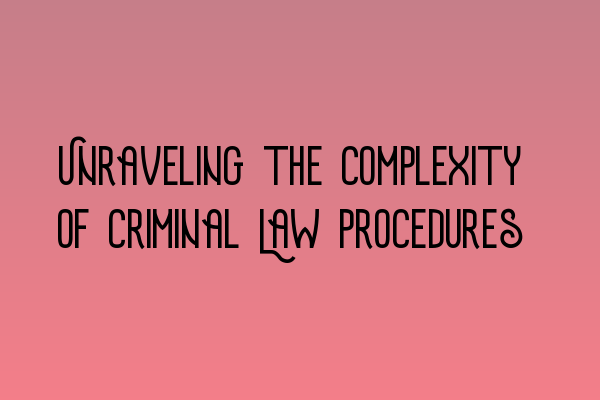Unraveling the Complexity of Criminal Law Procedures
When it comes to criminal law, there’s no denying that the procedures can be incredibly complex. From the initial arrest to the trial and potential sentencing, each step of the process requires careful attention to detail and a thorough understanding of the law.
At SQE Criminal Law & Practice Law UK, we understand the challenges that come with navigating the world of criminal law. With years of experience in defending clients in a wide range of criminal cases, we have witnessed firsthand the intricacies and nuances of the legal system. In this blog post, we aim to unravel some of the complexity surrounding criminal law procedures, shedding light on the various stages and providing essential information for aspiring solicitors, legal professionals, and even individuals looking to understand the process better.
1. Arrest and Detention
The first step in any criminal law procedure is the arrest and detention of a suspect. This is when law enforcement officers take a person into custody, believing them to be involved in a criminal offense. It’s important to note that an arrest can only take place if there is reasonable suspicion or probable cause.
During the arrest, the suspect may be read their rights, also known as the Miranda warning, which includes the right to remain silent and the right to legal counsel. These rights are crucial in ensuring that the suspect is aware of their legal protections and prevents self-incrimination.
For more information on the SQE exam preparation for aspiring solicitors, check out our related article: SQE Exam Prep: Essential Study Materials for Aspiring Solicitors.
2. Bail and Pre-trial Detention
Following the arrest, the accused individual may be eligible for release on bail pending trial. Bail is a financial guarantee that the defendant will appear in court and comply with any conditions set by the court. However, in cases where the court believes the suspect poses a flight risk or a danger to the community, they may order pre-trial detention.
Understanding the criteria and considerations for granting bail or ordering pre-trial detention is crucial for solicitors and legal professionals. It requires a deep understanding of the Criminal Procedure Rules and the ability to make compelling arguments in favor of the client.
3. Indictment and Plea
Once the investigation is complete, the prosecution may present the case to a grand jury or file an information or indictment directly with the court. This document outlines the charges against the defendant. At this stage, the accused has the opportunity to enter a plea, either guilty or not guilty.
Deciding on the appropriate plea requires a thorough understanding of the evidence, the law, and the potential consequences. As a solicitor, it’s essential to guide your client through this decision-making process, ensuring their interests are protected.
For a detailed breakdown of the Solicitors Qualifying Examination format, refer to our related article: Demystifying the Solicitors Qualifying Examination Format.
4. Trial
If the accused pleads not guilty, the case proceeds to trial. The trial is a formal court proceeding where the prosecution presents evidence and witnesses to prove the defendant’s guilt beyond a reasonable doubt. The defense has the opportunity to present counter-evidence and witnesses to challenge the prosecution’s case.
A successful defense requires a thorough understanding of the rules of evidence, the ability to cross-examine witnesses effectively, and the skill to present a persuasive argument to the jury or judge.
5. Sentencing and Appeals
If the accused is found guilty, the court moves to the sentencing phase. Sentencing can vary widely depending on the nature of the crime, the circumstances surrounding it, and the defendant’s criminal history. As a solicitor, it’s crucial to advocate for a fair and just sentence that takes into account all the relevant factors.
In some cases, the defendant may choose to appeal the conviction or the sentence. Appealing requires an in-depth knowledge of appellate procedures and the ability to identify potential errors in the trial process.
To learn more about the challenges and success strategies for international lawyers taking the SQE exam, visit our related article: SQE Exam for International Lawyers: Challenges and Success Strategies.
Conclusion
Unraveling the complexity of criminal law procedures is no easy task, but with the right knowledge and expertise, solicitors can navigate the legal system effectively to provide the best possible representation for their clients. From the initial arrest to the trial and potential sentencing, each step requires a deep understanding of the law, compelling arguments, and the ability to advocate for justice.
For a step-by-step guide on LLC formation in the UK, check out our related articles:
LLC Formation Made Simple: Step-by-Step Guide for UK Entrepreneurs and
LLC Formation: A Step-by-Step Guide for UK Entrepreneurs.
At SQE Criminal Law & Practice Law UK, we are dedicated to providing reliable and comprehensive information on criminal law procedures. Whether you’re an aspiring solicitor, a legal professional, or simply interested in understanding the complexities of criminal law, we are here to support you every step of the way.
